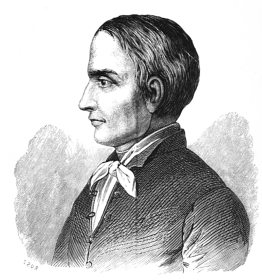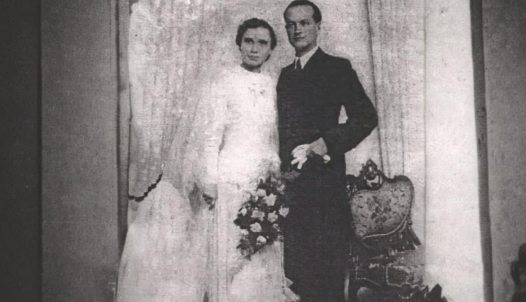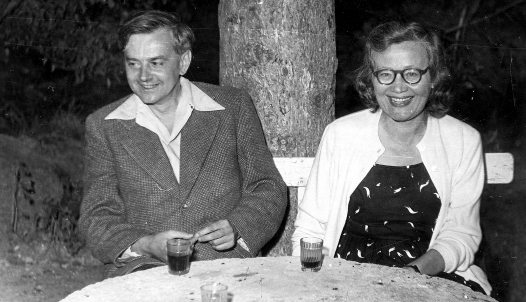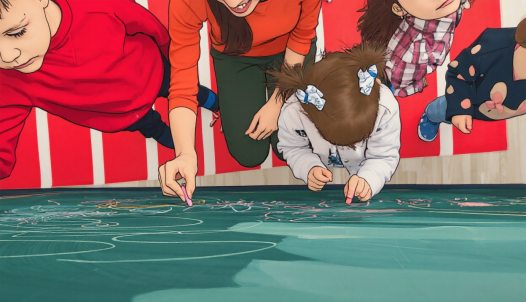Learning a new language at the age of 92 – Kató Lomb, one of the world's first simultaneous interpreters
She struggled with German as a child, but a few decades later, a Russian-English dictionary she found in a resale shop sealed her fate forever. Kató Lomb was forced to go into hiding during the Second World War because of her Jewish origins, but she continued to learn a language even during the siege of Budapest. She became a well-known simultaneous interpreter, travelled the world, translated into 16 languages, and understood 28. "Language is the only thing worth knowing even poorly, because while a doctor can't make a mistake because it could cost a patient his life, a grammatically incorrect but still understandable sentence can still be useful," she said. The story of a forgotten linguist who died twenty years ago.
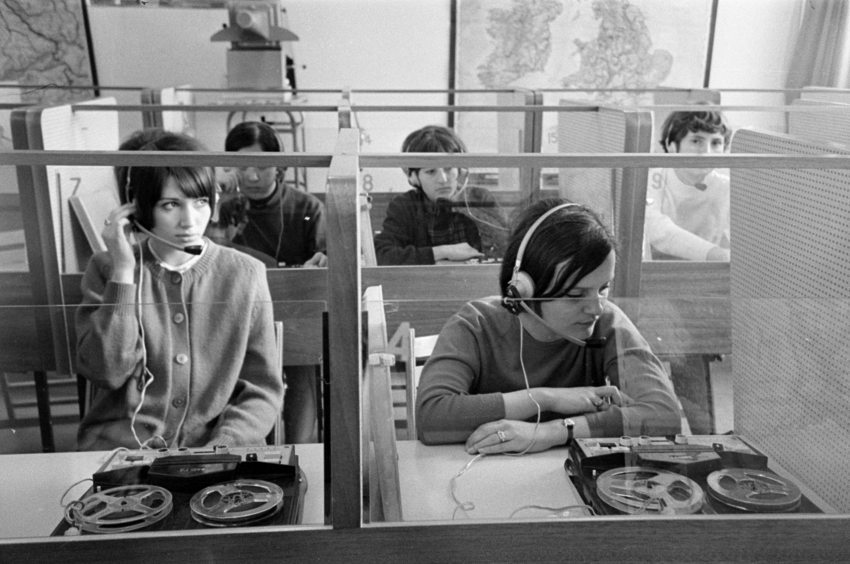
No one even suspected she would become an interpreter
Little Katalin was born in the winter of 1909, the daughter of Ármin Szilárd and Gizella Schwartz. Her father was a district doctor for the poor in a small rural town in Baranya County. Kató studied Latin and French at elementary school, but later, at high school in Pécs, she did not speak German well compared to her classmates, who were either looked after by a German governess or of Swabian (German-speaking) origin. "I was very far behind them," she told later at the Friderikusz Talk Show.
At the time, no one could have guessed that she would become one of the world's first simultaneous interpreters and that her language skills would take her around the world. After graduating from high school with a D in German, she went on to study chemistry at college and later earned a doctorate in physics and chemistry at the Erzsébet University of Pécs. "We don't like each other with chemistry, it doesn’t like me and I don’t like it. I lacked the precision and manuality that is essential for chemists," she told Tamás Vitray in the 1970s on the TV program “Ötszemközt”.
But back to the university years! When she finished her studies at the end of the 1930s, she could not find a job. There were more experienced professionals than she not finding jobs, let alone a beginner. Her personal life turned out well, however - in Budapest, in Terézváros, she married Frigyes Laub (Lomb), who was ten years older than her and took his name, thus becoming Kató Lomb from Dr. Katalin Szilárd.
Knocked at the mayor's office
Thus her diploma was of no use to her, and soon the Second World War intervened. Because of her Jewish origins, she was forced to go into hiding with her young son before and during the siege of Budapest. Her husband, also of Jewish origin, was spared by the Arrow Cross, as he was an electrical engineer at the LAUB factory, where vital military equipment was produced. In 1941, in a secondhand bookshop, she found a very old Russian-English dictionary.
"I was fascinated by this unfamiliar alphabet," she said.
She ran home and started to study and read a lot about Russian literature in translation. Russian was a forbidden language at the time, she had to hide the books, and the young wife studied even during the air raids - alone, without a language teacher. She learned Russian in two years.
When the war ended, she tried to look for a job. "During those weeks when the Soviets came in, I was pretty much the only person who could write on a Russian typewriter in Cyrillic, that was the main attraction to it," she said. So in February 1945, she took up a post as an interpreter for the then mayor-general. Budapest was in ruins, but the light was on in the mayor's office and she knocked on the door. "I asked him if he needed an interpreter. He replied, 'Stop talking so much, sit down and call the city commander,'" she recalled. Two years later, she found herself in Parliament interpreting for MPs.
”Language is the only thing worth knowing even poorly”
She was able to speak and interpret in ten languages, translate scientific literature and enjoy fiction in another six, and understand journalistic texts in eleven more.
She worked for money in 16 languages in total but knew at least 28 languages – at least at the level of written comprehension.
"How many languages do I know? I have only one mother tongue: Hungarian. I know Russian, German, English, and French well enough to be able to translate or interpret them in any combination at any time. For Spanish, Italian, Japanese, Chinese, and Polish, I have to prepare a bit: I read my own diaries in these languages. I read Swedish, Norwegian, Romanian, Portuguese, Dutch, Bulgarian and Czech literature: I can translate the written texts - political or technical", she wrote in her 1988 book Harmony of Babel.
Her book, Polyglot: How I Learn Languages, was published in 1970 and has gone through four editions. When the last edition was published in 1995, she told journalists: "When learning a language, it always helps to give yourself a bit of a pat on the back. Self-criticism and anxiety can be crippling." She believed that self-confidence and a good method play a much bigger role in language learning than linguistic talent. She did not believe that language learning should only be done at a young age, because language, according to Kató Lomb, is an effective tool not only for building human relationships but also for maintaining our mental ability and spiritual balance. She was convinced that it is not only in the native country of the target language that one can learn that language well.
"Language is the only thing worth knowing even poorly because while a doctor can't make a mistake because it could cost a patient his life, a grammatically incorrect but still understandable sentence can still be useful" – was her most famous saying.
She was a linguistic genius, but she didn't consider herself one. In her writing, she liked to use an equation she had invented for language learning: invested time × motivation/inhibition= result.
So if you know what you want to achieve by learning a language, and you can spend at least ten minutes every day, even with the tightest of work schedules, and put aside your fear of speaking, you'll have an easy time of it. She always clung to the fun part of language learning, was bored of the made-up dialogues in language books, and never went to a language teacher. Instead, her habit was to buy a good novel in the target language and use it to discover the basics, grammar, and vocabulary of that language.
She took notes in Chinese characters while working
She travelled the world as an interpreter, visited forty countries on five continents, and worked at international conferences. She interpreted for UNESCO meetings, and at one event she was able to take seven or eight interpreting seats thanks to her incredible skills.
While listening to the text, she took notes, not in Hungarian or in the target language, but, for example, when she had to translate from French into English, she took notes in Chinese characters for speed (in Chinese hieroglyphics, one symbol covers several words). As a professional interpreter, she was what might be called a freelancer or self-employed translator of the time. "Our employer changes three times a week," she explained to Vitray at the talk show.
She believed that there is only one world, but through languages you can get to know its many more colours and forms. During her travels abroad, she always engaged in conversation with locals.
"I go (into a shop) to bargain for a glove that I have no intention of buying, but it's a great way to expand my vocabulary." She picked up three new words, and it didn't really matter what the assistant thought.
In an interview, she also said that while people say that the Finnish language is related to Hungarian, Finland was the only country where she could not communicate in any language.
"Lecture, nature, skiing"
An interesting fact is that, although she was considered a language genius, she only had an official language exam in Chinese. "I then applied for a Japanese exam and was assigned an examiner, but when I heard that he was going to conduct the exam, I was so offended that I didn't go. And he was so scared that he had to test Kató Lomb that he didn't come either," she told Friderikusz at his Talk show. The examiner didn't know half as much as Kató Lomb.
"I tend to say about myself that I have three obsessions: lecture, or reading, nature, or nature walks, and skiing." She was passionate about all three. When interpreting was in the off-season, she would go skiing. As she put it, she skied through January. She was convinced that exercise helped with her mental work.
In her last years she was still keen to learn languages, and, according to her son, after the age of 92 she tried her hand at learning Ivrit (a modern version of Hebrew), but not with much success. She preferred to call herself a 'linguist' (as opposed to a philologist), referring to someone who learns several languages for practical purposes and out of interest.
By her own testimony, her long life has been brightened not by knowing languages, but by learning them.
Her death on 9 June 2003, at the age of 94, is as much forgotten as her achievements in life. Her passing was reported in only two or three newspapers. She is buried in Budapest, in the cemetery in Farkasrét.
Resources used:
MTI (Hungarian News Agency)
https://mystique.cafeblog.hu/2017/02/08/egy-elfeledett-lingvista-lomb-kato/
https://www.youtube.com/watch?v=yM95By6tzpQ
https://www.youtube.com/watch?v=ltcmUwFuIhA
https://www.youtube.com/watch?v=h_tEi31qKss
https://hu.wikipedia.org/wiki/Lomb_Kat%C3%B3
